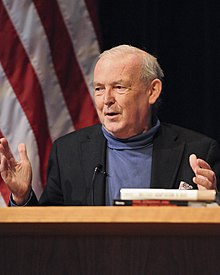Paul Kennedy
Appearance

Paul Michael Kennedy CBE FBA (born 17 June 1945) is a British historian specialising in the history of international relations, economic power and grand strategy. He is on the editorial board of numerous scholarly journals and writes for The New York Times, The Atlantic, and many foreign-language newspapers and magazines. His monthly column on current global issues is distributed worldwide by the Tribune Content Agency.
He has published on the history of British foreign policy and great power struggles, emphasizing the changing economic power base that undergirds military and naval strength, noting how declining economic power leads to reduced military and diplomatic weight.
Quotes
[edit]1980s
[edit]- As each great power has risen in the ranks, boosted by its expanding material base, it has tended to devote more and more of its resources to military protection – to guard its interests, to deter (or defeat) jealous rivals. Affording that protection is not such a great problem when the home economy is growing swiftly; when, however, the nation concerned becomes "mature" and its growth rates slow down, it becomes ever more difficult to maintain its extensive military and strategic obligations in the face of newer, faster-growing challengers. The faltering great power thus runs the risk of what I have termed "imperial overstretch", a widening gap between its global interests and obligations and its own capacity to defend them all.
- 'Benighted state of America', The Times (12 March 1988), p. 8
- Military power is sustained, in the final result, by economic power. If the latter crumbles, so eventually will the former.
- 'Benighted state of America', The Times (12 March 1988), p. 8
1990s
[edit]- Imperial overstretch has rarely occurred because a great power had too little military force; on the contrary, it was likely still to possess massive forces and at times to deploy them a long way from home. The real problem, it seems, has not been the force-projection capacities of the current number one, but a failure to recognise that long-term wealth and strength depend on the non-military dimensions of national power and on making hard political decisions on the home front.
- 'Display of might, but a gulf with the power that counts', The Times (1 September 1990), p. 10
- The emperors, kings, prime ministers and presidents of great powers have always preferred the heady world of diplomacy, war and international affairs to the unglamorous realm of fiscal reform, educational change and domestic renewal. That is understandable, since they will go down in history as leaders of this or that spectacular demonstration of the country's still-powerful military capacity. It is left to later generations to pay the price.
- 'Display of might, but a gulf with the power that counts', The Times (1 September 1990), p. 10
2000s
[edit]- The Enterprise is a vessel that defies the landlubber's imagination. It is more than 1,100ft long and its flight deck is 250ft across. It is as high as a 20-storey building... But this super-dreadnought never travels alone. It is always accompanied, at the very least, by an Aegis-type cruiser, a large surface ship designed to shoot down incoming missiles; by a bevy of frigates and destroyers to protect it from enemy submarines; by a lurking hunter-killer submarine or two; and by some supply vessels and other specialised craft. Marine troops and their helicopters will be in the task force. In offensive and defensive terms, this is a behemoth... What is more, no equivalent concentration of power to a US carrier task force exists in the world; the few UK, French and Indian carriers are minuscule by comparison, the Russian ones rusting away.
- The US possesses 12 such carriers (another, the USS Ronald Reagan, is to join the fleet soon), each with the attendant group of complementary warships. There are also smaller carriers designed, not for open-ocean combat against all, but to take powerful Marine Corps battalions ashore.
This array of force is staggering. Were it ever assembled en masse the result would be the largest concentration of naval and aerial force the world would have seen. - Nothing has ever existed like this disparity of power; nothing. I have returned to all of the comparative defence spending and military personnel statistics over the past 500 years that I compiled in The Rise and Fall of the Great Powers, and no other nation comes close. The Pax Britannica was run on the cheap, Britain's army was much smaller than European armies, and even the Royal Navy was equal only to the next two navies – right now all the other navies in the world combined could not dent American maritime supremacy.
- 'The eagle has landed', The Financial Times (1 February 2002)

